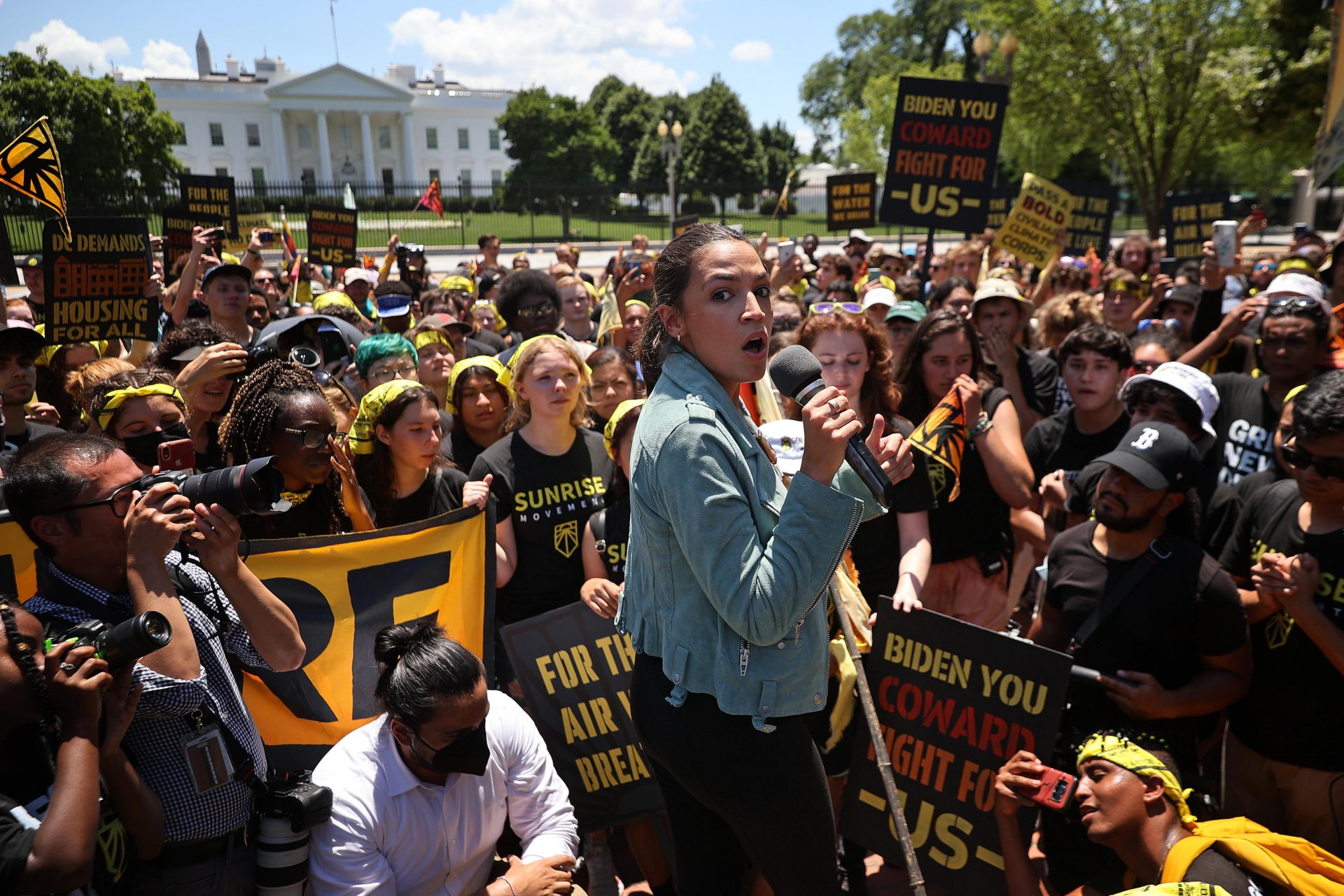Dear Slim, I wrote you but still ain’t callin’
I left my cell, my pager, and my home phone at the bottom
I sent two letters back in autumn, you must not-a got ’em
…Anyways, I hope you get this man, hit me back,
Just to chat, truly yours, your biggest fan
This is Stan
The lyrics, of course, are from Eminem and Dido’s zeitgeist-nailing song of two decades ago, Stan, about a maniacal, overly obsessed fan.
They illustrate a growing phenomenon in US politics that is being driven by cable and social media and mimicking, to an extent, the entertainment world.
I have been searching for a word to describe the intense devotion, for example, to two people from the opposite sides of the political spectrum: Alexandria Ocasio-Cortez, the Democratic congresswoman from New York, and Donald Trump, former president of the United States.
You simply cannot say a bad word about AOC – nor Kamala Harris, for that matter – without hearing from those fans. They are not the only ones.
I made a mild criticism of former president Barack Obama and his 60th birthday party on Martha’s Vineyard, which began as a spread worthy of Marie Antoinette until he got huge blowback from his followers. A family member of mine became hysterical. She utterly believes that Obama cannot and will not put a step wrong.
I have Trump people in my family, too, and when I said that he should be indicted for inciting the insurrection and sack of the Capitol last January 6, this relative lost it too. Beyonce and Oprah are folks with ‘Stans’ and I know that there are sports figures, TV personalities and musicians too, both here and there, who have Stans. That is normal for their world.
It is so fascinating to see how this is being openly applied to politics and it is driven, of course, by social media.
Donald Trump is the king of Standom, just as he was the king of reality/game TV after NBC created The Apprentice for him.
What Trump did was transfer the Standom he generated on TV into politics, blindsiding other politicians and political pundits alike. Even though he displayed riches beyond the reach of most Americans, what he zeroed in on was that he was getting one over on The Establishment.
That, of course, is the dream of many, so they attached their own version of that to him, thereby becoming Stans, and he could do no wrong. Literally.
Some people see AOC as an insurgent and, mixed in with her energy, photogenic qualities, youth, intelligence, ethnicity and gender, plus coming from a safe Democratic Party seat where it was time for the Old Guard to go, no wonder Senate majority leader Chuck Schumer is quaking. If she ran against him in the primary next year, she could beat him. And the Democrat usually wins that seat, so this is perfectly logical. But as well as her enemies, the Stans must shake her up a bit, too.
You could say that Standom extends to both Jeremy Corbyn and Boris Johnson, two guys universes apart, but who have supporters utterly and undyingly dedicated to them. The level of devotion would probably surprise both of them, too. But it is there. Standom is intense.
One of the biggest blowbacks that I have ever had on Twitter was the result of a tweet that I sent out, not about a politician, but a journalist. I thought that the comment was pretty anodyne, but I had crossed a line, as I soon saw. The reaction from this individual’s Stans surprised me.
One person railed at me about how much this columnist had got her through lockdown, and I could almost hear the tears in her tweet. I did not malign nor libel the journalist. I just stated that, in my opinion, the person wasn’t very funny and if they were, so what? Which I thought was pretty much just an opinion, but for some, I had shaken the foundations of their universe.
This is when I began to research this phenomenon of intense devotion and I found the word Stan for this largely social-media generated attachment and it made me wonder about what it all means.
Maybe it means that we can all speak equally, that we do not have to get the permission of being in the media or winning a prize or being given an honour or of being born royal, to say what we feel and who we need.
Maybe it means that there is something that has been unleashed, unlocked by the pandemic and the lockdown, and it feels individual and it feels like agency.
Pandemics throughout history have created profound change. The Black Death changed the relationship between serf and nobleman. It gave us the Protestant revolution, overthrowing forever the central religious power in the West.
The H1N1 pandemic a century ago, known then as the Spanish Flu, can be seen as a catalyst for artistic and political change, some great, some evil. All I feel now is that people are going to say more and more of what they feel and say it to whom they like and there are no more guardians at the gate.
We are all here, in a kind of equal space, and the downside of that is that there will be a battle for control of it. Someone or someones will own it, shape it. The speed this is happening at is phenomenal.
Warning: Illegal string offset 'link_id' in /mnt/storage/stage/www/wp-includes/bookmark.php on line 357
Notice: Trying to get property 'link_id' of non-object in /mnt/storage/stage/www/wp-includes/bookmark.php on line 37








